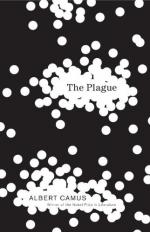|
|
The Plague Part 1 (Section 1)
Oran, the setting of the novel, is a French port on the Algerian coast, a small city that is about as ordinary as a city can be. Not only is it ordinary, it's ugly--with no trees and broiling hot weather in the summer and endless mud in the winter--a lifeless place to live and a miserable place to die. The narrator of the story, who doesn't tell us his name, lives in Oran. He knows the people of this city well, and describes them:
"... everyone is bored, and devotes himself to cultivating habits. Our citizens work hard, but solely with the object of getting rich. Their chief interest is in commerce, and their chief aim in life is, as they call it, 'doing business.'" Part 1, pg. 4
This is not very different from other cities of the world, says the narrator, where most people seem to fritter away a lot of their time. And it's not a horrible place--if you get in a habit, you can have an easy life here, and there is no social unrest in the town.
The narrator's story starts on April 16, in the 1940s, when Dr. Bernard Rieux steps on a rat in the hallway of his apartment building. He tells the concierge M. Michel about the rat, but the concierge refuses to believe that there are rodents in his building. That evening there is another rat--this one dies in front of Dr. Rieux--sweating, swaying, and spurting blood before it goes stiff. The blood makes Dr. Rieux think about his sick wife, Mme. Rieux, who is leaving for treatment at a sanatorium the next day.
The next morning, before he starts his morning rounds, Dr. Rieux finds more dead rats in the hallway. As he drives to the outskirts of town, he sees even more rats. His first patient of the day, a sickly old Spanish asthma patient who spends his days moving dried peas from one pot to another, is very excited about the rats, shouting oddly that it's "the hunger!" that has brought the rats out to die. All around town, people are talking about the rats.
Dr. Rieux takes his wife to the train station, and after he confesses that he wishes he'd been a better husband to her, they decide they will make a fresh start when she returns from the sanatorium. Until then, Rieux's mother will come and live in his apartment, to take care of him in the absence of his wife.
After the train leaves, Rieux runs into M. Othon, the town magistrate, and his young son, Jacques. Othon is tall and dark--he seems both worldly and overly stiff, and he expresses some concern about all of these dead rats to Rieux. Rieux says he thinks it's nothing to worry about.
The next day, a young journalist named Raymond Rambert calls on Rieux, wanting information for an article he's writing about the living conditions among the Arab population in Oran. Dr. Rieux, who believes strongly that the Arabs are living in horrible conditions, tells this to Rambert, and asks him if he is willing to tell the whole truth in his article. He doesn't like Rambert's answer, and refuses to help.
Later that day, in the hallway, Rieux runs into Jean Tarrou, a youngish man with a big, furrowed face, and together they watch another rat die. Rieux runs into the concierge again, who is now definitely bothered by the rats, and looking a little sick himself. Soon the city starts to clean the streets of rats, and there are so many rats that the people of Oran start to get a little uneasy:
"You must picture the consternation of our little town, hitherto so tranquil, and now, out of the blue, shaken to its core, like a quite healthy man who all of a sudden feels his temperature shoot up and the blood seething like wildfire in his veins." Part 1, pg. 16
It gets as bad as 8000 dead rats in one day, when, suddenly, the dead rats disappear. This same day, Rieux finds M. Michel looking very sick; he is sweating and swelling, leaning on the arm of Father Paneloux, the learned Jesuit priest in town. Rieux sends the concierge to bed, and not long after gets a call from one of his former patients, Joseph Grand, who says one of his neighbors has had an accident and needs help at once. The neighbor, Cottard, has tried, unsuccessfully, to hang himself. Cottard gets very nervous when Rieux says that as a formality, the police have to be notified.
When Rieux returns to check on the concierge, he finds him vomiting, sprouting ganglia, and running a high fever. He is in extreme pain, and Rieux is so disturbed by the case that he calls a medical colleague, Richard, to ask if he's seen any similar cases. Richard says yes, two, and although M. Michel has a brief moment of improvement, he dies an awful death in the ambulance on the way to the hospital, screaming as he dies: "Them rats!"




